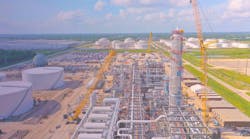Sam Fletcher
OGJ Online
HOUSTON, Feb. 13 -- Some of the US ammonia and other industrial chemical markets that were lost when natural gas prices spiked in the winter of 2000-01 will never be regained because some of that manufacturing capacity is being lost to foreign imports, an industry executive reported Wednesday.
Ammonia imports have increased 20% this year over 1998 levels as more US manufacturing capacity shut down in the face of higher costs for natural gas and lower prices for methanol and nitrogen products, said Michael Bennett, president and CEO of Terra Industries Inc., Sioux City, Iowa. Terra Industries produces methanol; anhydrous ammonia, the basic ingredient for most nitrogen fertilizers and many industrial products; and urea ammonium nitrate and ammonium nitrate, the most preferred nitrogen fertilizers in the US and Britain.
The recent drop of US gas market prices below $2/Mcf has increased the ability of US manufacturers to compete with imports of ammonia and nitrogen products. But a return of $3/Mcf gas would increase imports by another 35%, while backing out more US manufacturing capacity. "We have a tough time competing with imports at $3/Mcf," said Bennett on Wednesday Bennett at an energy conference in Houston sponsored by the Cambridge Energy Associates.
He said a fly-up of $5/Mcf in gas prices would see imports supplying as much as 80% of the US market for ammonia and nitrogen products.
That could be a major market loss to natural gas producers. Ammonia production previously accounted for 10% of industrial demand for natural gas in this country and 3% of total US gas demand, analysts said. (OGJ Online, Oct. 22, 2001).
Nitrogen manufacturers such as Terra Industries enjoyed a business boom during the mid-1990s that resulted in over-building manufacturing capacity, particularly overseas where natural gas supplies were both cheap and abundant, said.
Now that foreign capacity is replacing US manufacturing capacity, especially among plants on the Gulf Coast that were pinched both by higher prices for natural gas, the sole feedstock purchased, and by higher costs of transporting the end fertilizer product to the primary farm markets in the Midwest.
Once that US capacity is closed, it is "gone forever", Bennett said. However, he said, there is one unusual new market that is likely to increase US demand for ammonia.
The scrubbing process for cleaning up NOx emissions at coal-fired plants and power generators is expected to increase the US ammonia market by some 10% over the next few years, Bennett said.
Contact Sam Fletcher at [email protected]
